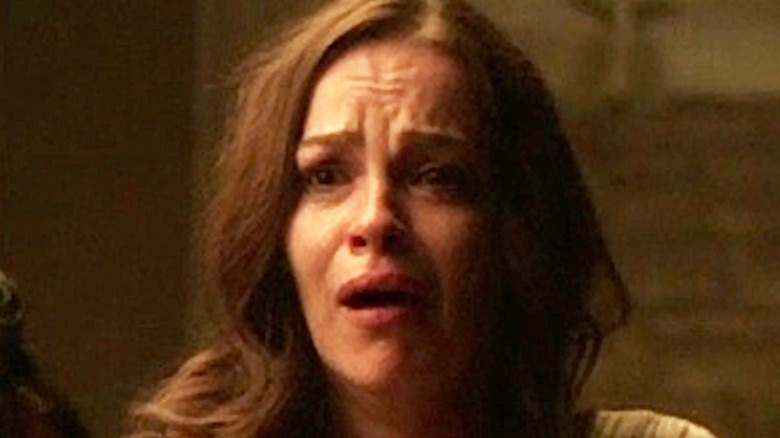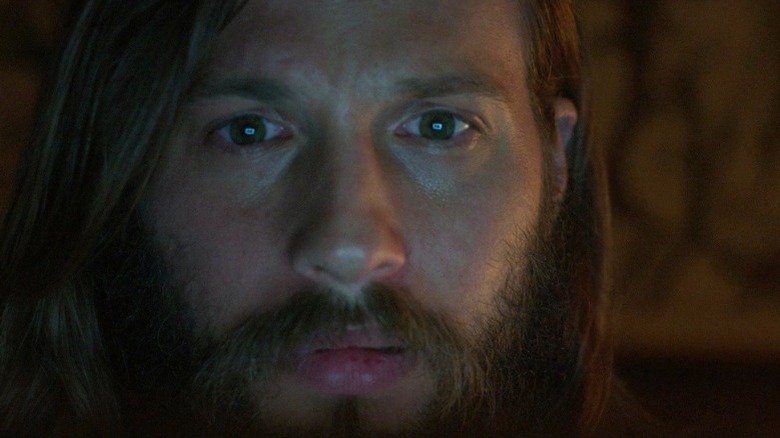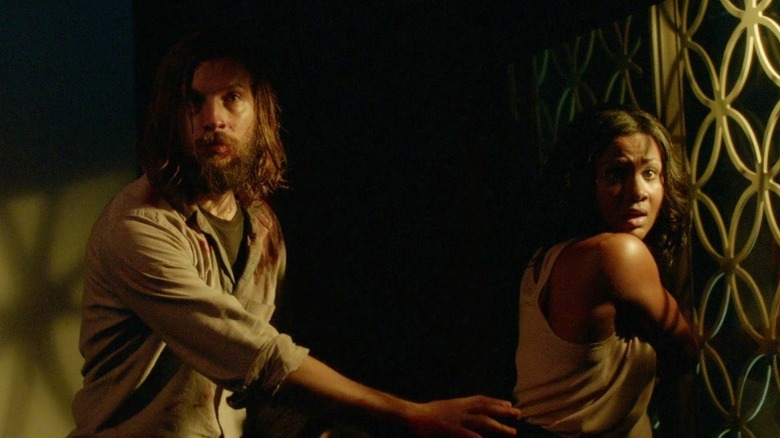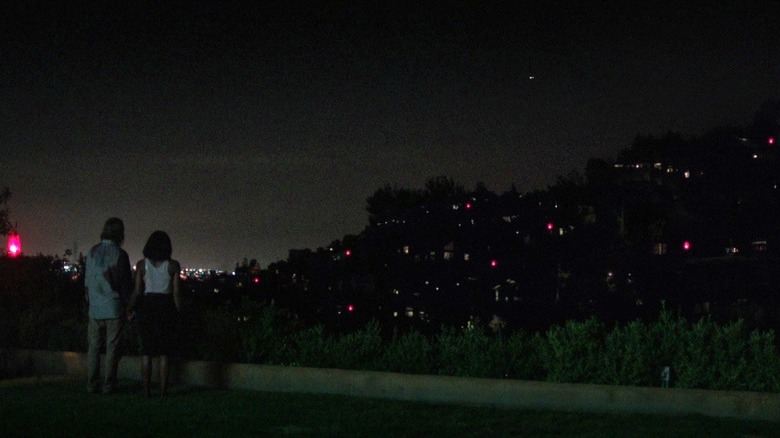The Ending Of The Invitation Explained
The film industry at large is not nearly as hospitable to women filmmakers as it should be, and that's particularly true of genre cinema. Statistics for 2019 show that the playing fields with the lowest percentages of women directors by far are sci-fi, horror, and action (via Women and Hollywood), reflecting the hesitation of execs to trust women with high budgets and supposedly "masculine" audience demands. It's all the more extraordinary, then, that we have someone like Karyn Kusama.
With five films under her belt, the American filmmaker has shattered countless glass ceilings as not just a woman but a woman of color, securing her place as one of the leading genre auteurs of the 21st century. In "Girlfight," Kusama revitalized the boxing movie and introduced the world to Michelle Rodriguez; in "Jennifer's Body," she crafted an ahead-of-its-time pop-punk feminist masterpiece that only grows in reputation with each passing year. But her biggest accomplishment yet may have been "The Invitation," a taut, near-perfect single-location thriller that keeps getting scarier and scarier long after the credits roll.
Ostensibly a dinner-party-from-hell chillfest in the tradition of classics like "Rope" and "House on Haunted Hill," "The Invitation" reveals its deeper themes as slowly and patiently as it does its horror, weaving both into a gut-wrenching exploration of the way grief and despair can swallow a person whole. It all comes together during the very last minutes, which may be the darkest of any movie you'll find on Netflix.
The Invitation goes for creeping inevitability instead of big surprises
The thing that makes "The Invitation" so perversely effective is that there's no big reveal. The ending, in which the titular grief support group is revealed to be a death cult with designs on liberation from pain via liberation from the flesh, is pretty much on par with what you'd expect just off the basic logline "Couple attends a creepy dinner party." Instead of channeling its energy towards a big twist that we'd probably be able to guess anyway, the movie focuses on the getting-there: Will's (Logan Marshall-Green) trials feel so suffocating because his suspicions are correct.
To that end, the big explanatory moments that we'd usually find in the third act of a movie like "The Invitation" are replaced with a sinking feeling of inevitability. We know that things are gonna get worse, but the movie dwells on the why — which is the truly scary part. After enveloping viewers in the grief Will and Eden (Tammy Blanchard) feel for their son Ty, Kusama and screenwriters Phil Hay and Matt Manfredi posit the philosophy of "The Invitation" as a terrible, yet chillingly understandable respite. With every shock or discovery about Eden's new life, Will inches closer to the black hole of grief, the secret fear that the pain is not worth working through, that life in this world may no longer be worth living.
Then, all the cult members do is make that fear manifest, in a sequence so rapid and visceral that there's barely time to process it. In a way, this climax puts a bow on Will's arc by forcing him to fight for the here and now; it's not until the movie's final seconds that the weight of what happened really sinks in.
The cult members in The Invitation believe they're entitled to killing people
If there is a question fueling the suspense of "The Invitation," it's not "What will the cult members do?" but "What do they hope to accomplish?" To some extent, a cult like The Invitation is invariably defined by irrationality, acts of faith, and herd mentality — someone like Dr. Joseph (Toby Huss) starts it, and everyone else just follows along. Maybe, if "The Invitation" ended on a simpler note, we'd be able to shrug off the cult's targeting of innocent people as just pure chaos, or evil. But the moment we find out that simultaneous rituals are occurring all over the city, the movie confronts us: is it really chaos? Or is it something deeper?
In an interview at the time of the release, Kusama said (via RogerEbert.com) that the movie couldn't be set anywhere other than Los Angeles, despite the lack of outdoor scenes. "There is something about the mythology of Southern California, the sense of self-reinvention that is promised here to so many people who kind of flock to the city," the director said. "The Invitation" is as much about grief as it is about the self-delusion of people in a certain social milieu, who believe that "our emotional life is a faucet that you turn on and off, and that we are in control of it entirely," as Kusama put it. Therefore, the reason so many cult members are persuaded into killing their innocent guests is simple: They feel entitled to it.
The Invitation shows what happens when denial is culturally encouraged
One of the cruelest aspects of grief is the isolation that comes with it, the feeling that you're alone in your pain and everybody's just pretending to understand you and care about you. As Will's flashback tour around his old house and the interactions with his friends make abundantly clear, the sense of unease and abnormality created by grief is something even the best-intentioned outsiders have trouble grasping.
It doesn't take a huge leap to imagine how that feeling of isolation may have gotten to The Invitation's members, and convinced them that they needed to "reclaim" their lost friends by bringing them forcibly into the fold. Just as Eden, David (Michiel Huisman), and their cohorts believe that they can outright refuse to feel pain by ending their own lives, they also believe they have a right to extend their worldview to other people, forcing them to "connect" with it, if they won't do so of their own accord.
The scene that provides the most important context for the cult's actions is the one where Eden impulsively slaps Ben (Jay Larson), then hastily tries to smooth things over with pleasantries. She believes, like so many in her social circles, that she can make herself and her world immune to problems with a positive attitude — that a fake, yet problem-free world is preferable to a real one where pain exists. What the ending of "The Invitation" reveals is that this warped worldview is endemic. Will and Kira (Emayatzy Corinealdi) make it out alive, yet trapped in a Los Angeles overrun with people who would sooner kill their problems than come to terms with them. Like all of Karyn Kusama's films, it's as much thrill ride as social commentary.



